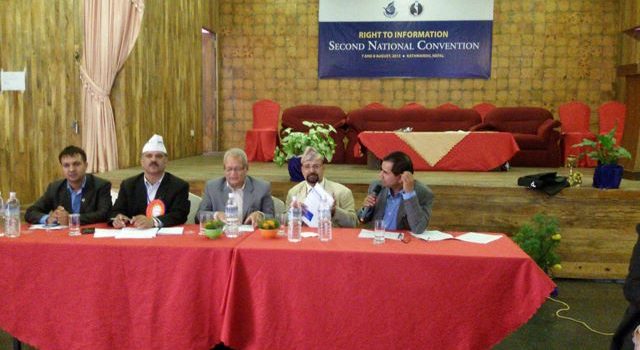freedom1 Forum organized a two-day National Convention on right to information (RTI) in Kathmandu on August 7 and 8, where the RTI campaigners showed concern over growing security threats on them. Citing it, they demanded safety.
The Convention was inaugurated by Minister for Information and Communications, Dr Minendra Rijal. On the occasion, Minister Dr Rijal said government was committed to protecting citizen’ right to information. He requested RTI campaigners to be aware of the right to privacy while seeking information.
The participants numbering over 350 issues the Kathmandu Declaration with the resolution on expanding RTI network throughout the country.
The RTI campaigners from 55 districts, and legal practitioners, RTI activists, researchers, government officials, university teachers, social scientists, and development practitioners, among others reviewed the challenges and achievements of the RTI since the first convention of 2011 and suggested the government, NIC, public agencies, and civil society organizations on how they could be committed to protecting and promoting RTI to build informed citizenry, an essential element of participatory democracy.
During the extensive deliberations for two days in the convention, the participants urged the government to amend RTI Act to ensure the information easily and quickly to the citizen. During the crisis, flow of information must be ensured quickly, they stressed.
The government was criticized for the failure on managing crisis information as witnessed during the earthquake.
Similarly, the National Information Commission was suggested for further activism with training and awareness campaigns on importance of RTI in the grassroots. Such campaigns in the local levels were must to empower people to ensure their rights, argued the participants. The convention had presentations of eight working papers on different themes relating to RTI.
In the first day, four working papers were presented: i) “25 Years of RTI in Nepal” by Taranath Dahal, Chairperson of FF, ii) “Role of National Information Commission to Promote RTI” by Kiran Pokharel, Commissioner at NIC, iii) “Role of Nepal Government to Promote RTI” by Shreeram Pant, former secretary at NIC, and iv) “Safety Threat on RTI Campaigner” by Dharmendra Jha, General Secretary of FF.
Similarly, on the second day, v) presentation on “RTI and Youth Students” was made by Haribinod Adhikari, Vice-Chairperson of FF, vi) “Disclosure for Open and Transparent Culture” by youth activist Anirudra Neupane, vii) “RTI in Disaster” by Dr Sudhamshu Dahal and VIII) “Role of NGOs to Promote RTI” by Tanka Aryal, Executive Director at CCRI.
The RTI campaigners from different districts shared how they were hassled, disallowed and even threatened while seeking information in the public offices, full of irregularities. Laxman Sharraf, a youth from Parsa, a district from southern plains, shared that he was detained by police for over 24 hours merely because he sought information in the District Agricultural Office. Mr Sharraf also shared plight that the police persons involved in his arrest and detention were not taken action till date.
Attending the Convention, Chairman of the Development Committee of the Parliament, Rabindra Adhikari, also expressed commitment to citizen’s right to information, a fundamental right.
Meanwhile, Chief Commissioner at NIC, Krishna Hari Baskota, committed during the closing of the convention that the NIC had taken the suggestions of the RTI campaigners positively and would expand its activities to all districts across the country.
Chairman of the organizing body, freedom1 Forum, Taranath Dahal, observed that the huge and enthusiastic participation of the RTI campaigners, activists, researchers, government officials numbering over 350 was the realization of a need to expand RTI regime for good governance in the country.
“The convention was fruitful to make the government, parliamentarians aware on value of RTI; prod NIC for more activism, and encourage campaigners to continue the movement, so that the fundamental rights of people would be guaranteed and transparency and accountability built in public offices,” he added.
Second National Convention on RTI
Categories: News and Events

